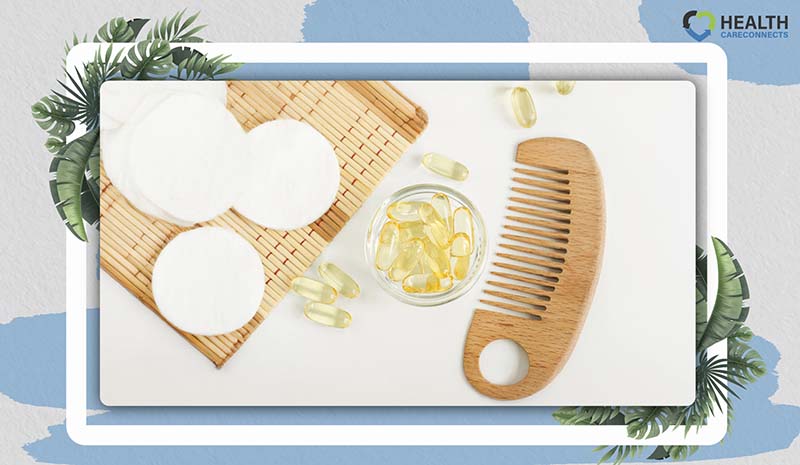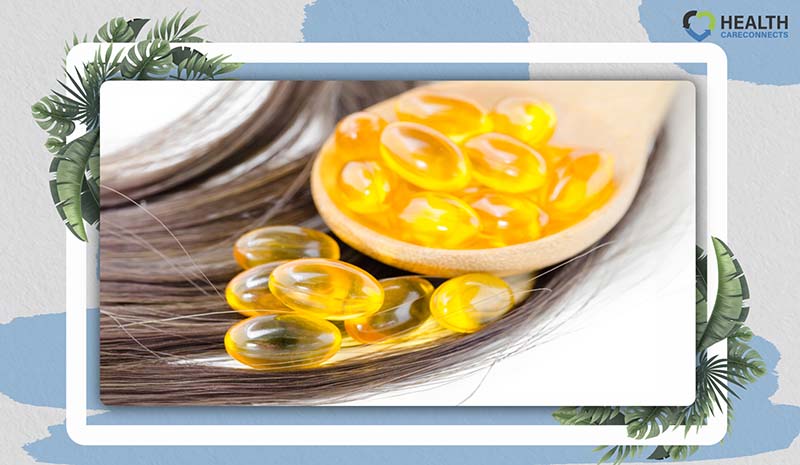Fish oil is a well-known dietary supplement praised for its abundance of omega-3 fatty acids and essential nutrients. It’s often celebrated for fostering overall well-being.
People who favor natural remedies turn to fish oil to help manage a variety of conditions, from mental health struggles to persistent illnesses.
The omega-3s found in fish oil are believed to aid in the regulation of the body’s inherent processes. Proponents claim that it may also stimulate hair growth, strengthen hair, and nourish hair follicles.
Continue reading to learn more about the potential benefits of fish oil for hair and explore the question: “Does fish oil help hair growth?”
Does Fish Oil Help Hair Growth?
Most research on fish oil has focused on its potential effects on hair loss. While these studies have been small, their findings suggest that fish oil may promote hair growth.
Fish oil may achieve this by helping hair enter its growth phase or stay there longer.
Hair grows in four stages: anagen, catagen, telogen, and exogen. The anagen stage is when growth occurs. A 2018 animal study found that fermented mackerel oil increased the time hair spent in the anagen phase. However, it’s important to note that this finding may not apply to humans.
A 2015 study with 120 female participants found that a supplement containing omega-3s and omega-6s reduced the amount of hair in the telogen (resting) stage and increased the amount in the anagen (growth) stage.
Compared to a control group, participants who took the supplement for six months reported less hair loss and more growth.
While these results are promising, more research is needed to determine whether fish oil can reliably support hair growth in everyone.

Hair Benefits of Fish Oil
Fish oil supplements are increasingly popular for their potential benefits in promoting hair growth and preventing hair loss.
Rich in omega-3 fatty acids, these supplements offer several advantages for hair health.
Improves Hair Thickness
A notable study from 2015 discovered that a regimen combining omega-3s, omega-6s, and antioxidants can significantly impact hair growth cycles.
Participants observed not only a reduction in the hair’s telogen, or resting phase, but also an enhancement in the anagen, or growing phase, leading to thicker hair after six months.
Promotes Growth
Research conducted in 2018 on the effects of a mackerel-derived fermented fish oil extract showed promising results in hair follicle stimulation.
The study indicated that DHA, a primary omega-3 in the extract, boosts the production of dermal papilla cells, crucial for hair growth regulation.
Reduces Hair Loss
The same 2015 study also reported that a majority of participants experienced a decrease in hair loss after six months.
This finding highlights fish oil’s potential as a supportive treatment for hair loss, which can affect individuals regardless of gender.

Other Uses for Fish Oil
Fish oil offers a multitude of health benefits beyond just improving hair health, thanks to its rich content of omega-3 fatty acids, particularly EPA and DHA.
- Heart Health: Omega-3 fatty acids are proven champions for cardiovascular health. They effectively lower levels of triglycerides and cholesterol, reduce blood pressure, and prevent the buildup of arterial plaques. Regular intake of fish oil can significantly bolster heart health and decrease the risk of heart diseases.
- Brain Function: The omega-3s in fish oil are vital for maintaining brain health. Numerous studies have shown that fish oil supplements can aid in treating mental health issues like depression. Additionally, these supplements have been found to alleviate symptoms of ADHD in children and may help stave off cognitive decline and dementia as we age.
- Eye Health: A deficiency in omega-3 fatty acids is linked to an increased risk of eye diseases, including age-related macular degeneration (AMD). Regular consumption of fish or fish oil supplements is associated with a lowered risk of AMD, suggesting significant benefits for eye health.
- Reduced Inflammation: Fish oil’s anti-inflammatory properties are beneficial for managing and reducing inflammation within the body. This can be particularly advantageous for those suffering from inflammatory conditions such as inflammatory bowel disease, rheumatoid arthritis, and asthma.
How to Use Fish Oil for Hair Growth
Fish oil can be used in several ways to harness its benefits for hair health, depending on personal preference and tolerance. Here are some effective methods:
- Topical Application: Applying fish oil directly to your scalp and hair roots can be beneficial. However, be mindful of its strong odor, which some might find unpleasant. If you choose this method, consider blending the fish oil with essential oils like lavender or peppermint to mask the smell.
- Diet: Incorporating fatty fish such as salmon, mackerel, and tuna into your regular diet is a delicious and natural way to obtain fish oil. These fish are abundant sources of omega-3 fatty acids, which are crucial for hair health and overall wellness.
- Supplements: For those who prefer a straightforward and odor-free option, fish oil capsules are available. These supplements provide a simple and convenient method to consume fish oil and reap its benefits for hair growth without the taste or smell of fish.

Individuals Who Should Avoid Fish Oil
Fish oil is not suitable for everyone and should be used with caution by certain individuals. People with allergies to fish or soybeans should avoid fish oil supplements due to potential allergens that could trigger reactions.
Those with diabetes, particularly type II, should be cautious as high doses of fish oil can raise blood glucose levels, necessitating a consultation with a doctor before use.
Individuals suffering from liver disease must consult their healthcare provider before starting fish oil supplements to ensure they do not adversely affect liver function.
Similarly, those with pancreas disorders or an underactive thyroid should seek medical advice to avoid exacerbating their condition.
Lastly, regular alcohol consumers, especially those who drink more than two alcoholic beverages daily, should use fish oil with caution due to possible interactions with alcohol that could worsen health issues.
Recommended Dosage of Fish Oil
Although EPA and DHA are not considered essential nutrients, they are highly beneficial omega-3 fatty acids, and there is a general guideline for their intake. Harvard Health suggests that a typical daily amount for an adult should be between 250 and 500 milligrams (mg) of EPA and DHA combined.
The actual amount of EPA and DHA can vary significantly between different brands of fish oil supplements. For instance, 1,000 mg of fish oil from one brand might contain different levels of EPA and DHA compared to the same amount from another brand. This variation makes it essential to read supplement labels carefully to understand the specific EPA and DHA content.
For those looking to get omega-3s naturally, oily fish like salmon, mackerel, and sardines are excellent sources of EPA and DHA. For vegetarians or vegans, algae oil is a viable alternative as it is one of the few plant sources that contain these types of omega-3s.
If you decide to take a fish oil supplement, it’s advisable to consume it with a meal that includes fat. This practice can enhance the absorption of omega-3 fatty acids, making the supplement more effective. This method leverages the fact that omega-3 fatty acids are fat-soluble, meaning they are absorbed and transported in the presence of dietary fat.
Fish Oil’s Effectiveness for Thinning Hair
Fish oil could be beneficial for thinning hair, as it potentially enhances both hair growth and hair quality. The link between fish oil and hair health primarily stems from its ability to extend the duration of the hair’s growth phase. This extended growth phase can give the appearance of fuller, thicker hair.
Moreover, a notable 2015 study reported that participants using a supplement blend of omega-3s and omega-6s experienced significant improvements in hair diameter and density after six months. These findings suggest that regular intake of fish oil could effectively contribute to stronger, healthier hair, as it enriches the hair follicles with essential nutrients that support hair growth and reduce hair thinning.

Possible Side Effects of Fish Oil Usage
Fish oil is generally well-tolerated by most people, and any side effects that do occur are typically mild. The most common side effects include:
- Bad breath
- A fishy aftertaste
- Unpleasant-smelling sweat
- Indigestion
- Nausea
- Diarrhea
Additionally, taking high doses of fish oil can interfere with blood clotting, which could be hazardous for individuals with bleeding disorders. Such high doses might also amplify the effects of anticoagulant medications, such as warfarin (Coumadin), increasing the risk of excessive bleeding.
With these considerations in mind, consult your healthcare provider before starting a fish oil supplement. This step ensures that the supplement will not adversely affect their health or interact negatively with other medications they may be taking.
Conclusion
While it’s not conclusively proven, many wonder, “Does fish oil help hair growth?” Taking a fish oil supplement and applying it topically to the hair might support hair health and assist with symptoms of thinning. However, more research is necessary to fully substantiate these claims.
If you’re considering using fish oil for your hair, be sure to discuss it with your healthcare provider before adding this or any new supplement to your daily routine. This conversation is crucial to determine if fish oil is a safe and suitable option for your health needs.
For those seeking more information and honest product reviews, I recommend visiting HealthCareConnect.

Dr. Joyce Slater: Your Guide to Informed Health Choices
Dr. Joyce Slater shines as a distinguished expert in the field of nutrition and public health. Contributing her vast expertise to HealthConnectbc, she embodies a deep-seated passion for enhancing public well-being. As a respected figure in her field. Dr. Slater’s academic journey and professional achievements are nothing short of inspirational.
Holding a significant position as a researcher and educator, Dr. Slater has delved deeply into the intricacies of food literacy and nutritional science. Her work, prominently featured in numerous esteemed scientific publications, underscores her dedication to expanding our understanding of food’s role in health and society.
At the heart of Dr. Slater’s professional ethos is a profound desire to positively impact individual lives through education and research. She often says, “Empowering people with the knowledge to make healthier choices is the most rewarding aspect of my work.” This principle is the cornerstone of her involvement with HealthConnectbc, where she strives to provide reliable and practical health advice.
Dr. Slater’s contributions to HealthConnectbc are multifaceted: academically, she offers insights into the complex world of nutrition and health, enhancing both public understanding and professional practices. Additionally, she is instrumental in guiding and inspiring the next generation of health professionals, thus fostering future excellence in the field.
Juggling rigorous research with her educational duties, Dr. Slater demonstrates an unwavering commitment to her profession. Her approachable nature and genuine concern transcend the confines of academia, touching the lives of everyone she interacts with. Dr. Slater looks forward to continuing her journey of discovery and education, dedicated to the ongoing improvement of public health and nutrition.
At HealthConnectbc, Dr. J. Slater is not just a contributor; she is a guiding light, dedicated to enlightening and motivating individuals towards a healthier and more informed lifestyle.
PUBLISHED ARTICLES
- Food literacy competencies: A conceptual framework for youth transitioning to adulthood (2018)
- Self-perceived eating habits and food skills of Canadians (2016)
- Challenges to acquiring and utilizing food literacy: Perceptions of young Canadian adults (2016)
- Socio-demographic and geographic analysis of overweight and obesity in Canadian adults (2009)
- Sustainable well-being: Concepts, issues, and educational practices (2014)

